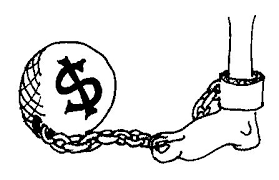
I keep reading about debt problems around the world and how the governments around the world are going to fix them. In focus this year is the plight of the Eurozone sparked by the periphery countries known as the PIIGS (Portual, Ireland, Italy, Greece, and Spain). This blog is intended to be accessible to everyone so I will simplify as much as possible.
Problems:
Too much debt and too little income. Similar to buying a house when you have a high paying job, and then getting laid off and realizing that you can no longer afford it. This is the basis of the sovereign debt crisis.
Trial Solutions:
The current solution is based around the idea of “stimulus”. By borrowing more now, growth is encouraged, immediate repayment of debt can be largely ignored, and hopefully future income will be more than enough to cover the additional debt burden. Going back to my previous analogy, this is like leveraging credit card debt or going to a loan shark for some additional money so that you can keep your house; all while you try as hard as you can to improve your skills and try to get a higher paying job knowing that you are really “up a creek without a paddle.”
Other Complexities:
- Sovereign credit scores are deteriorating so everyone is reluctant to lend additional money just to help pay off older debt.
- “Guaranteed” entitlements in defined benefit plans such as pension retirements make the paying back new debt a very iffy proposition.
- Politicians and their inability to convey the feelings of the masses in their legislation over those who “lobby” them (e.g. big banks and big money).
- Free market economics, and Adam Smith’s invisible hand of capitalism squared off against the welfare of society.
- The Eurozone and the idea that chaos would ensue if it breaks up.
- A hidden risk that everyone assumes but is scared talk about: the end of capitalism and the western world as we know it if sovereign default dominos start to fall in the developed western countries of the world.
Ok, so each one of these additional complexities warrants a full fledged post but this is not really supposed to be a finance and economics blog, just a record of some of my random thoughts and ramblings so if there is enough interest I will create a separate page to explain this stuff and how it affects you, otherwise just wait until I get another urge to talk about money.
My thoughts
If we compare the sovereign debt issue to a person unable to pay his/her credit card debts, what happens in this scenario? Banks will not give additional money, instead they will send a collection agency to try and get some residual value from the unpaid debt. Then the person will start again from scratch, albeit with a much lower credit score, and the bank will only lend additional money at a much higher interest rate commensurate with the updated default risk. So without trying to be clever about a solution and using our capitalistic guidelines for bankruptcy, a sovereign country that cannot pay his or her debt should default and start over with a more manageable debt burden. Now doesn’t this seem like a simple solution?
Maybe this is oversimplifying the issue, but don’t we all want to find the most elegant solution and move on?
Ok, I’m a realist too. Here’s why will this solution will not succeed with our current socio-economic landscape in the west. Despite the fact that we in the west consider ourselves to be democratic, we see many examples where the majority does not rule. The truth behind our democracy is that “dollar votes” are worth more than “political votes.” Those with high concentrations of money can vote with their dollars to ensure their own survival and well-being.

Lets look at the immediate (first order) winners and losers in the standard sovereign default scenario.
Standard Scenario:
Winners: The country which defaulted on it’s bonds and can now start fresh. Despite a lower credit rating, they can still borrow from the free market without any additional manipulation. They can even take additional steps to reduce interest expense by issuing securitized bonds or by targeting the lowest interest rates on their forward yield curve.
Losers: Banks and countries that lent money to the defaulting country.
Tossup: Citizens who were owed money by the defaulting country depending on order of seniority (are entitlements such as social security and pensions super senior to sovereign bonds? Should they be?)
In the current scenario that is unfolding now, where banks and countries are getting together to give a “super bailout” and kick the debt can as far down the road as possible while requiring citizens to make concessions (decreased entitlements, lower standards of living, and increased taxes) in , look how the winners and losers change.
Actual Scenario:
Winners: Banks and countries that lent money to the defaulting country.
Losers: Citizens and people who were owed money by the defaulting country depending on order of seniority (are entitlements such as social security and pensions super senior to sovereign bonds? Should they be?). These citizens also suffer the burden of the lingering debt that did not go away and will have to pay increased taxes for their forseeable future.
Tossup: Because there is no actual default event, the debt burden continues to linger. However, the “super bailout” facilitates free market lending at reasonable rates. Probably great in the short term but horrible in the long term.
So normally, banks would be the biggest loser, but somehow in this new grand ultra-deluxe bailout final 3.1 scheme, we are seeing a shift to citizens of each country taking the brunt of the burden. I guess this is why the Occupy Wall St movement is so strong. The goal should be to Occupy Wall St to get some voting power back and level the playing field. The term austerity seems to be less related to fiscal responsibility than it is to reallocation of the distribution of wealth from the poor to the rich.

